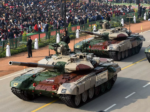Henry Kissinger’s Evolving Relations with India: From Discord to Embracing Strategic Ties

Image Source: News18
The passing of Henry Kissinger at 100 marks the journey of an influential American diplomat who traversed a complex trajectory in his relations with India, reflecting the evolution of international realpolitik. Initially critical of Prime Minister Indira Gandhi in the 1970s, with declassified tapes revealing disparaging remarks, Kissinger’s later years witnessed a shift, advocating robust US-India ties under Prime Minister Narendra Modi.
Kissinger’s philosophy encapsulated the essence of international relations: “There are no permanent friends or enemies, only permanent interests.” Decades after his discord with India’s leadership, he vocally supported closer ties with the country, demonstrating the pragmatic nature of diplomacy.
His endorsement of India emerged prominently during Modi’s tenure, where Kissinger became an advocate for strengthened bilateral relations. Despite health constraints, he attended events and engaged in diplomatic dialogues, underscoring the significance he attached to fostering ties with India.
During a public appearance in 2018, Kissinger lauded India’s strategic acumen, a departure from earlier sentiments. Notably, in the 1970s, he played a pivotal role in establishing the US India Business Council (USIBC), initially exhibiting interest in India’s position in global affairs.
Kissinger’s foresight envisioned India and Japan as potential permanent members of the UN Security Council as early as 1972. However, evolving dynamics, including the burgeoning emergence of China, altered the focus of American foreign policy.
In reflecting on historical events, Kissinger acknowledged the brinkmanship during the Bangladesh crisis, emphasizing India’s intricate role and its policy of neutrality. He highlighted the transformative potential in fostering bilateral ties amidst global upheavals, recognizing the essentiality of peace and progress in collaborations.
Declassified documents revealed insights into Kissinger’s interactions with Indian leaders, including discussions post-India’s nuclear test, showcasing India’s desire for equitable Indo-US relations despite ideological differences.
Henry Kissinger’s journey from contentious moments with India’s leadership to advocating robust ties reflects the nuanced dynamics of international diplomacy. His evolving stance underscores the complexities and shifting priorities in global relations, encapsulating the diplomatic pragmatism he epitomized throughout his influential career.
Team Profile

- News Writer
- Harshit Tokas is a Political Science and International Affairs Post-Graduate with a passion for understanding and analyzing complex political landscapes. Skilled in research, data analysis, and policy development. Eager to contribute his knowledge and insights to drive positive change.
Latest entries
 English1 December 2023Ambati Rayudu Backs Ruturaj Gaikwad as a Future Leader of Indian Cricket
English1 December 2023Ambati Rayudu Backs Ruturaj Gaikwad as a Future Leader of Indian Cricket English1 December 2023Changing Tide: Pujara and Rahane Omitted from South Africa Tour Squad
English1 December 2023Changing Tide: Pujara and Rahane Omitted from South Africa Tour Squad Defence1 December 2023India Greenlights Procurement of Advanced Military Assets in Multi-billion Defence Upgrade
Defence1 December 2023India Greenlights Procurement of Advanced Military Assets in Multi-billion Defence Upgrade English1 December 2023Delhi Government Pushes for Completion of Asia’s Largest Wastewater Treatment Plant
English1 December 2023Delhi Government Pushes for Completion of Asia’s Largest Wastewater Treatment Plant









